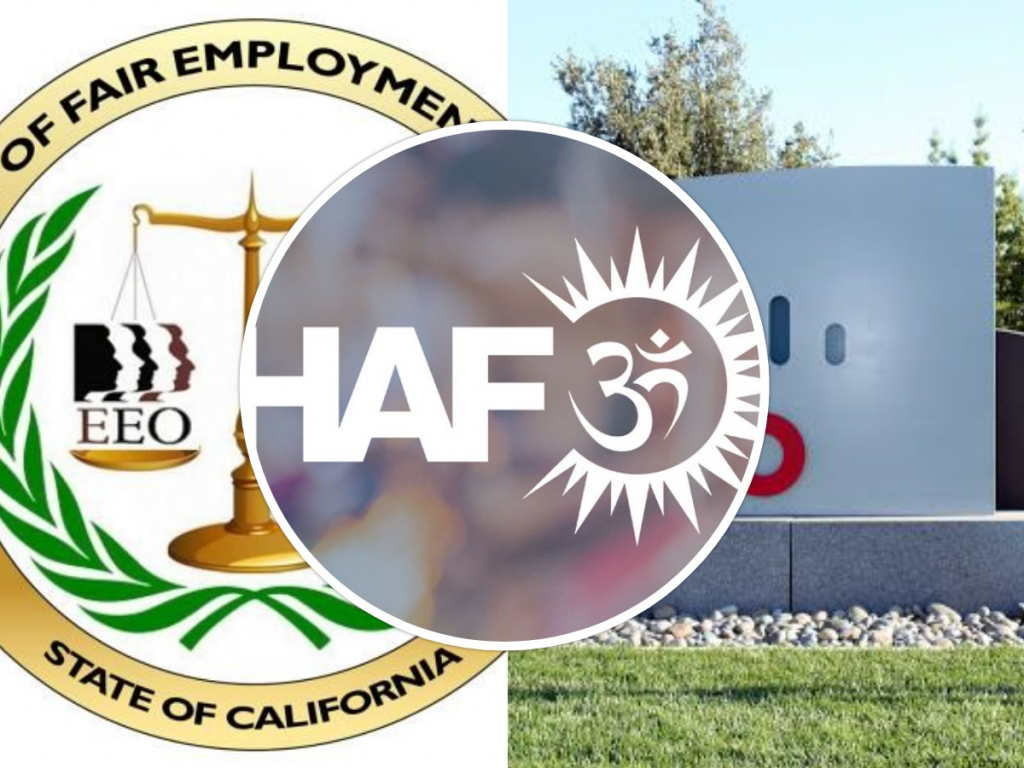
- Hindu American Foundation (HAF) has filed a motion in Santa Clara County Superior Court to intervene in the case of California Department of Fair Employment and Housing v. Cisco Systems.
- California argues that Cisco failed to address discrimination against one of its engineers by co-workers on the basis of his presumed caste.
- California goes on to state that caste is “a strict Hindu social and religious hierarchy” and therefore an integral part of Hindu teachings and practices.
- HAF has said that by framing its argument in this way, California is attempting to do what the Constitution clearly says it cannot, HAF said: defining Hindu religious doctrine for Hindus.
- The HAF argues that there is no role for government to define our religious beliefs, whether it be Hinduism, Islam, Judaism, Christianity or any other in the United States and that the Constitution expressly prohibits it.
- This inaccurate and unconstitutional definition by California state would perversely lead to increased targeting of and discrimination against Indian-origin, and particularly Hindu workers, the HAF stated.
Last week the Hindu American Foundation (HAF) filed a motion in Santa Clara County Superior Court to intervene in the case of California Department of Fair Employment and Housing v. Cisco Systems. HAF has filed for injunctive relief to prevent the state’s overreach and violation of Hindu American rights under the First and Fourteenth Amendment and California’s Unruh Civil Rights Act. HAF’s motion to intervene takes no stance on the specific allegations of discrimination in the case.
HAF is represented in this motion by Narayan Travelstead PC, of Pleasanton, California, says the HAF website.
HAF’s Executive Director Suhag Shukla said “HAF vehemently opposes all discrimination and stopping it is a worthy goal, one that directly furthers Hinduism’s teachings about the equal presence of the divine in all people. But, wrongly tying Hindu religious beliefs to the abhorrent act of caste discrimination undermines that goal and violates the First and Fourteenth Amendment rights of all Hindu Americans”, he clarified.
In its complaint, California argues that Cisco failed to address discrimination against one of its engineers by co-workers on the basis of his presumed caste. California goes on to state that caste is “a strict Hindu social and religious hierarchy” and therefore an integral part of Hindu teachings and practices.
Framing its argument in this way, California is attempting to do what the Constitution clearly says it cannot, HAF said: defining Hindu religious doctrine for Hindus.
“In the United States, there is no role for government to define our religious beliefs, whether it be Hinduism, Islam, Judaism, Christianity or any other. In fact, the Constitution expressly prohibits it. HAF’s actions are an important step in protecting the rights of all Americans,” stated Tim Travelstead, lead attorney for HAF.
Should California’s attempted violation of the First Amendment rights succeed, the due process rights of all Hindu Americans would also be violated, claimed Foundation representatives, says the HAF.
In its filing, HAF asserted that California provided no definition or workable method to determine anyone’s caste other than an assumption that Hindus of Indian decent must identify as part of a specific caste, ascribe to a “social and religious hierarchy,” and engage in caste discrimination. This inaccurate and unconstitutional definition would perversely lead to increased targeting of and discrimination against Indian-origin, and particularly Hindu workers, the HAF stated.
California’s case against Cisco Systems
The State of California’s Department of Fair Employment and Housing sued Cisco Systems in June 2020, accusing the company of engaging in unlawful employment practices over a claim by an Indian-origin employee that two managers, also of Indian origin, allegedly discriminated against him on the basis of his assumed caste. The case was initially filed in federal court, but has since been re-filed in state court. Cisco Systems is promising a vigorous defense, rejecting the claim of discrimination.
The HAF in an article posted on its website explains why California’s case against Cisco Systems is unconstitutional.
The HAF article states that the State of California has asserted that the caste system is “a strict Hindu social and religious hierarchy,” and therefore an integral part of Hindu teachings and practices. This is in contradiction to the precepts of the religion and the beliefs of an overwhelming number of its own adherents. The State is asserting that Hinduism is inherently discriminatory and that all Hindus discriminate, says the article.
The piece further explains that California has also failed to provide any definition or workable method to determine anyone’s caste. It’s not concerned with what Hindus actually believe and is instead targeting them on its presumption that all Hindus of Indian decent must identify as part of a specific caste, believe in a “strict Hindu social and religious hierarchy,” and engage in caste discrimination just because they’re Hindu, it says.
California’s actions blatantly violate the rights of Hindu Americans, says the HAF article. The US Constitution prohibits the state from interfering in questions of religious doctrine and prevents the state from depriving any American of their right to liberty asserts HAF.
